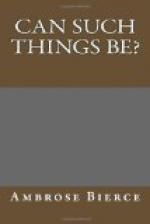“Two years ago,” began Mr. Beeson, “I, with two companions, occupied this house; but when the rush to the Flat occurred we left, along with the rest. In ten hours the Gulch was deserted. That evening, however, I discovered I had left behind me a valuable pistol (that is it) and returned for it, passing the night here alone, as I have passed every night since. I must explain that a few days before we left, our Chinese domestic had the misfortune to die while the ground was frozen so hard that it was impossible to dig a grave in the usual way. So, on the day of our hasty departure, we cut through the floor there, and gave him such burial as we could. But before putting him down I had the extremely bad taste to cut off his pigtail and spike it to that beam above his grave, where you may see it at this moment, or, preferably, when warmth has given you leisure for observation.
“I stated, did I not, that the Chinaman came to his death from natural causes? I had, of course, nothing to do with that, and returned through no irresistible attraction, or morbid fascination, but only because I had forgotten a pistol. This is clear to you, is it not, sir?”
The visitor nodded gravely. He appeared to be a man of few words, if any. Mr. Beeson continued:
“According to the Chinese faith, a man is like a kite: he cannot go to heaven without a tail. Well, to shorten this tedious story— which, however, I thought it my duty to relate—on that night, while I was here alone and thinking of anything but him, that Chinaman came back for his pigtail.
“He did not get it.”
At this point Mr. Beeson relapsed into blank silence. Perhaps he was fatigued by the unwonted exercise of speaking; perhaps he had conjured up a memory that demanded his undivided attention. The wind was now fairly abroad, and the pines along the mountainside sang with singular distinctness. The narrator continued:
“You say you do not see much in that, and I must confess I do not myself.
“But he keeps coming!”
There was another long silence, during which both stared into the fire without the movement of a limb. Then Mr. Beeson broke out, almost fiercely, fixing his eyes on what he could see of the impassive face of his auditor:
“Give it him? Sir, in this matter I have no intention of troubling anyone for advice. You will pardon me, I am sure”—here he became singularly persuasive—“but I have ventured to nail that pigtail fast, and have assumed the somewhat onerous obligation of guarding it. So it is quite impossible to act on your considerate suggestion.
“Do you play me for a Modoc?”
Nothing could exceed the sudden ferocity with which he thrust this indignant remonstrance into the ear of his guest. It was as if he had struck him on the side of the head with a steel gauntlet. It was a protest, but it was a challenge. To be mistaken for a coward—to be played for a Modoc: these two expressions are one. Sometimes it is a Chinaman. Do you play me for a Chinaman? is a question frequently addressed to the ear of the suddenly dead.




